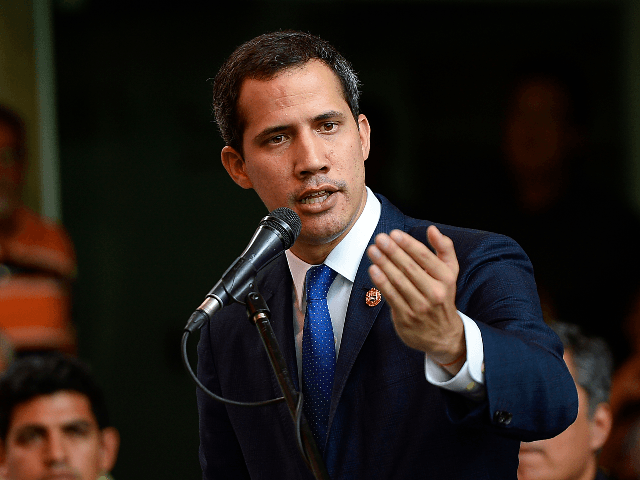A poll published Tuesday revealed that nearly 80 percent of Venezuelans believe President Donald Trump should stop supporting Juan Guaidó, the legitimate president of the country, after nearly two years of failing to exercise his power.
Guaidó became president of Venezuela in January 2019 after socialist dictator Nicolás Maduro’s last term expired. The National Assembly, the federal legislature, has the power to appoint an interim president when the incumbent fails to vacate or a “rupture in the democratic order” occurs, according to the Venezuelan constitution. Guaidó was president of the National Assembly when lawmakers chose him.
Maduro has failed to vacate the presidential palace and retains control of the Venezuelan armed forces, meaning Guaidó has almost entirely failed to act on his status as president, outside of appointing ambassadors to countries that recognize his legitimacy. The new poll, published this week by survey company Meganálisis, seems to indicate exhaustion and a lack of faith that Guaidó has used the tremendous goodwill he has built up in the West due to his legal status as president to actually free Veenzuela of its socialist regime.
Until early 2020, Guaidó was a member of the Popular Will party, also a socialist organization and a full member of the Socialist International. The Socialist International has routinely condemned Maduro’s United Socialist Party of Venezuela (PSUV) for not fulfilling what it deems to be the social responsibilities of government.
In its latest survey, taken from July 10 to July 15 nationwide, Meganálisis asked respondents if they believed that President Trump, one of the first world leaders to recognize Guaidó as president, should stop supporting him and support another politician. Of those asked, 78.8 percent replied Trump should do so.
MEGANALISIS
Venezuela Julio 2020
Estudio CATI del 10 al 15 de Julio 2020Descarga el resto del fragmento publicado:https://t.co/58MRifyDTY
Descarga resumen del fragmento no publicado:https://t.co/D9hgorC5Px
…… pic.twitter.com/eJ5rwlLqBd— Meganalisis (@Meganalisis) July 21, 2020
Only 11 percent of respondents, or about one in ten, said that Trump should continue supporting Guaidó, while about the same amount said they did not know. Asked more directly about Guaidó’s character, 83.1 percent of respondents said yes to the question, “do you think Guaidó is a weak politician?”, while only five percent said “no.”
The extremely negative responses towards Guaidó did not appear to mean that Venezuelans were supportive of Maduro, under whose leadership the decline begun by late dictator Hugo Chávez became much more rapid and acute. The survey also asked Venezuelans if they believed that Maduro “satisfied the needs of Venezuelans. About 70 percent answered “no,” while only 15 percent said yes.
A similarly overwhelming majority, 69.3 percent, said they did not trust Maduro’s creation of a new National Electoral Commission to oversee elections during the pandemic – led by judicial authorities responsible for repressing anti-socialist dissidents and at least one Holocaust denier. Maduro has presided over at least five elections international observers have deemed fraudulent since the former bus driver took over for Chávez.
Guaidó received significant support from the Venezuelan people for much of early 2019, following his ascent to the presidency. Much of the attitude in the country towards him changed after he announced on April 30, 2019, that he had convinced the leaders of the armed forces to follow his lead, not Maduro’s, and called for civilians to take the streets against Maduro’s forces. Maduro appeared on television the next day stating that his military leaders had done nothing of the sort and that he would violently repress any protest activity.
Though Guaidó appealed continuously to civilians, Maduro appearing on television with his top military leaders and a lack of coherent plan to remove them on Guaidó’s part resulted in Venezuelans losing hope in the endeavor. Ultimately, Guaidó apparently failed to attract the support of any Venezuelan soldiers, save for a small number who defected to Colombia and orchestrated a failed attack on Maduro two months ago.
Throughout his tenure, while leading publicity events like the April 2019 takeover, Guaidó has treated the Maduro regime as a legitimate negotiation partner, coming to the table with seemingly arbitrary intermediaries like the nations of Norway and Sweden to attempt to make humanitarian agreements with Maduro. The talks resulted in an agreement in June with the Pan-American Health Organization (PAHO), a subsidiary of the World Health Organization (W.H.O.) to allow Chinese coronavirus aid into the country. It is unclear at press time if any of that aid has arrived.
Prior polls from Meganálisis this year revealed disillusion with Guaidó. In May, nearly 90 percent of respondents told the pollster that Guaidó was not capable of governing the country; 80 percent said Guaidó’s opposition had “no credibility.” Perhaps the impetus behind this month’s responses, 86 percent said that Guaidó had squandered the resources offered to him by President Trump.
Trump’s last large gesture of support to Guaidó occurred in February, when he attended Trump’s State of the Union address as a special guest. Trump acknowledged him from the podium and vowed to support a free, non-socialist Venezuela.
While supporting Guaidó is also the default position of accepting the legitimacy of the Venezuelan constitution, Trump’s overtures towards Guaidó were largely the product of former National Security Advisor John Bolton’s strategy. After his removal from the position in September, Trump stated, “I disagreed with John Bolton on his attitudes on Venezuela. I thought he was way out of line and I think I’ve proven to be right,” without elaborating. In his recently released “tell-all” book, Bolton complained that Trump specifically lacked trust in Guaidó.
Follow Frances Martel on Facebook and Twitter.

COMMENTS
Please let us know if you're having issues with commenting.